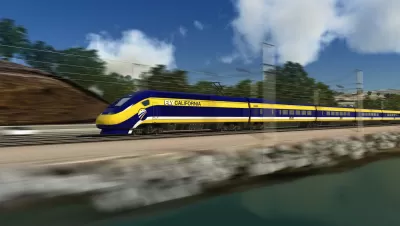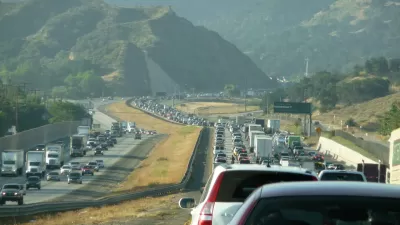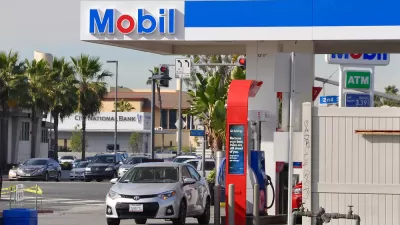A follow-up initiative to Proposition 6 would put the brakes on high-speed rail in California and funnel gas tax funds to roads.

Rachel Swan reports on a recently-filed California ballot measure that would stop the state's high-speed rail project from moving forward and prevent it from using gas-tax funds for public transit. This challenge comes from supporters of Proposition 6, an upcoming California ballot measure that would repeal the gas tax passed last year.
In addition to killing [Jerry] Brown's $77 billion plan to send bullet trains zipping from Southern California to downtown San Francisco, the initiative that [Carl] DeMaio and others submitted on Tuesday would mandate that all gas tax revenue go to roads. It would also dedicate the state's sales tax on cars to all forms of transportation infrastructure including public transit, require annual audits on road projects and shift decision-making power on gas and car tax revenue from the state Capitol to city and county governments.
Supporters of this new measure say that state funds for roads would increase by $2.7 billion and for transit infrastructure by $5.6 billion. Critics argue that the initiative is not much different than an alternative to the gas tax measure that Republicans put forth last year. "Other lawmakers rejected the plan because it blocked gas tax money from flowing into the general fund, where it helps shore up schools, health care and public safety," says Swan.
John Cox, the Republican candidate for governor, supports the effort to end the high-speed rail project. With high-speed rail as a central issue for Republican voters, who favor road and highway projects, the proposed measure is also seen as a way to get those voters to the polls and to increase support for Cox.
FULL STORY: Gas-tax opponents file proposal to kill $77 billion high-speed train

Alabama: Trump Terminates Settlements for Black Communities Harmed By Raw Sewage
Trump deemed the landmark civil rights agreement “illegal DEI and environmental justice policy.”

Study: Maui’s Plan to Convert Vacation Rentals to Long-Term Housing Could Cause Nearly $1 Billion Economic Loss
The plan would reduce visitor accommodation by 25% resulting in 1,900 jobs lost.

Why Should We Subsidize Public Transportation?
Many public transit agencies face financial stress due to rising costs, declining fare revenue, and declining subsidies. Transit advocates must provide a strong business case for increasing public transit funding.

Paris Bike Boom Leads to Steep Drop in Air Pollution
The French city’s air quality has improved dramatically in the past 20 years, coinciding with a growth in cycling.

Why Housing Costs More to Build in California Than in Texas
Hard costs like labor and materials combined with ‘soft’ costs such as permitting make building in the San Francisco Bay Area almost three times as costly as in Texas cities.

San Diego County Sees a Rise in Urban Coyotes
San Diego County experiences a rise in urban coyotes, as sightings become prevalent throughout its urban neighbourhoods and surrounding areas.
Urban Design for Planners 1: Software Tools
This six-course series explores essential urban design concepts using open source software and equips planners with the tools they need to participate fully in the urban design process.
Planning for Universal Design
Learn the tools for implementing Universal Design in planning regulations.
Smith Gee Studio
Alamo Area Metropolitan Planning Organization
City of Santa Clarita
Institute for Housing and Urban Development Studies (IHS)
City of Grandview
Harvard GSD Executive Education
Toledo-Lucas County Plan Commissions
Salt Lake City
NYU Wagner Graduate School of Public Service





























